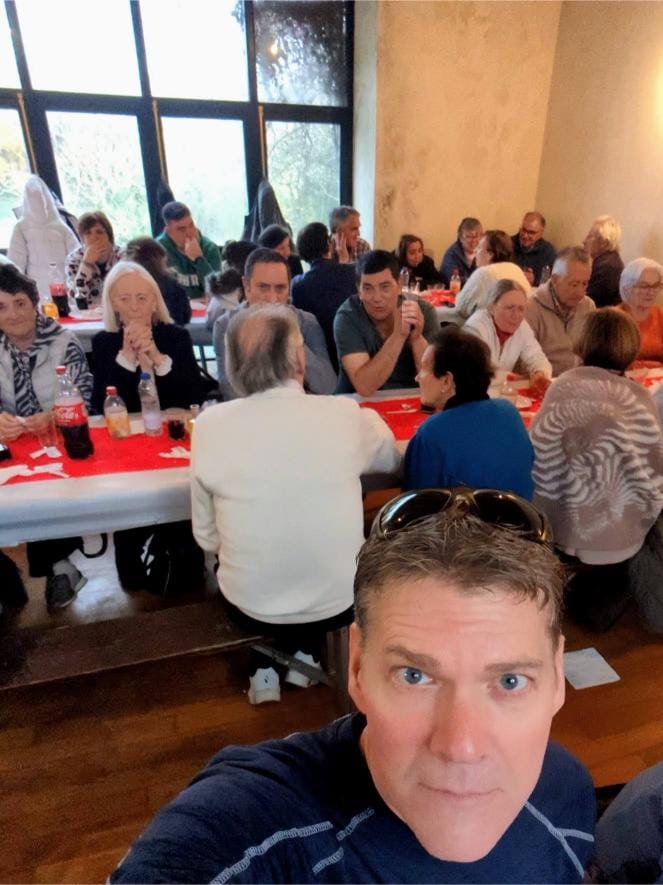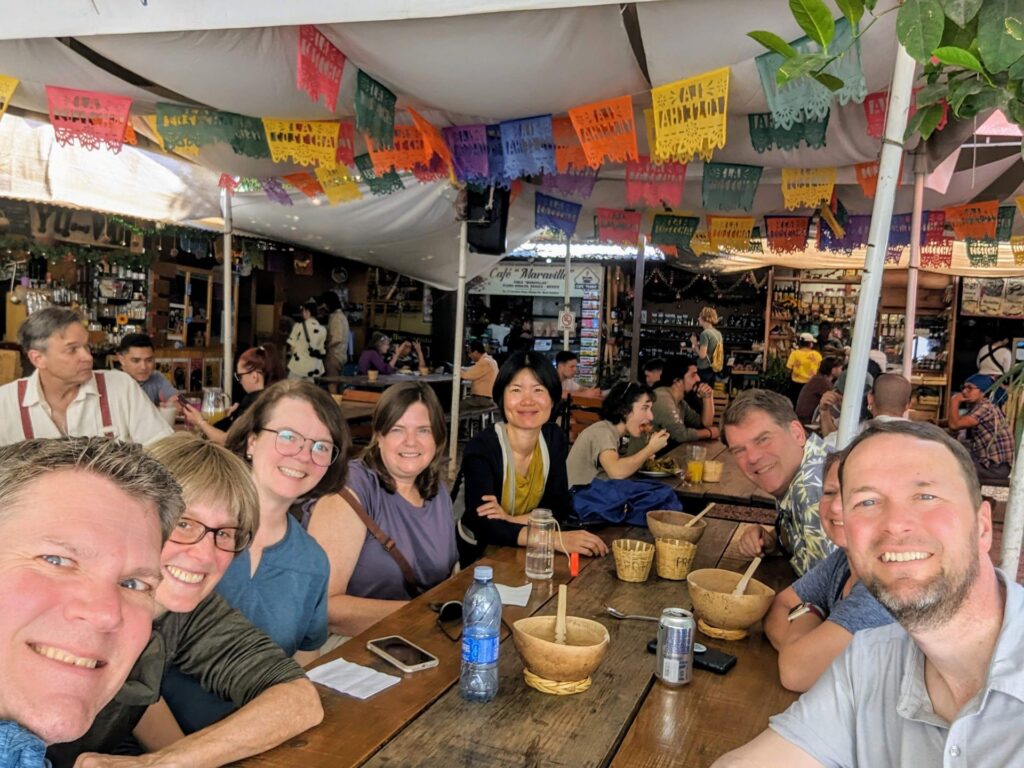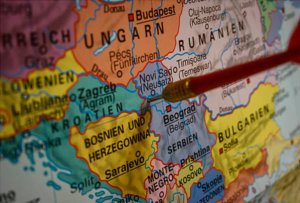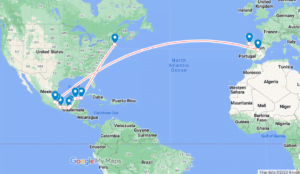
Being Thankful For Slow Travel
Greetings from Galicia, Spain!
We hope that our North American friends have had a great Thanksgiving holiday, and will have an equally enjoyable Christmas holiday too.
As mentioned in a recent post, we are visiting our friends Lisa & Stewart this winter and have had a great time enjoying country life. We look forward to spending the holiday season with company for a change!
And the extended downtime has allowed for a period of reflection.
Specifically, we are thankful that we chose a slow travel lifestyle for the international phase of our lives, rather than the fast travel alternative we experienced last October.
So what do we appreciate the most about slow travel? And have we come to hate faster, more traditional styles of travel?
The answer is more nuanced than you might think.
What Is Slow Travel Anyway?
This is actually a tricky question to answer, and there are different opinions on the subject.
For us, we’d say that slow travel is any form of travel where you stay in one location (preferably one apartment) for at least 4 weeks.
Others might object to our definition for various reasons, and they aren’t necessarily wrong. Heck, some would say that staying in a place for a week or two is slow travel compared to changing locations every other day as many vacationers do.
But for us, staying in one place for 4 weeks (or more) is the perfect amount of time to maximize the perks of travel while minimizing the downsides.
So what are the upsides, you ask?
Let me explain.
Cheaper Rent
I’ve spoken about this at length in past posts, but the discounts you get for Airbnb long stays (28 days or more) are significant.
In one case, our discount was as much as 72%!
This greatly reduces the overall cost of our lifestyle and allows us to travel frugally without compromising our financial future.
Cheaper Food Options
When you are staying in one apartment for a month with a decent kitchen and refrigerator, you can take advantage of local markets (and local prices) for food.
There are other advantages as well.
You can buy in bulk when you know your monthly consumption rates, take advantage of perishable food “sell-by-date” discounts, and make more economical meals!
And eating leftovers further lowers the daily cost of meals.
When you fast travel, it is difficult to do any of these things. Specifically, you are more likely to eat out at places convenient to your location, which can hit your budget if you are in a tourist zone.
Time To Figure Out Daily Life
After a long day of international travel, it is nice to arrive at your new apartment and not feel immediate pressure to start checking off boxes on your travel to-do list.
Rather, you can take things slow the next day or two, get to know your neighborhood, and figure out the little (but important) things without any time pressure.
And it can reveal new opportunities.
For example, figuring out public transportation can allow access to experiences different from the well-traveled tourist paths. Visiting multiple supermarkets in the same neighborhood will inform you which offers the best deals. And you can find well-hidden local restaurants that are real diamonds in the rough.
Although this doesn’t sound as interesting as visiting major tourist sites, there is real comfort, familiarity, and satisfaction in figuring all of this out.
In other words, your new destination starts to feel like a home.
Time For Sick Days
Not every day in our slow travel lives is fun, free, and easy.
We’ve gotten stomach bugs, altitude sickness, colds, and other minor illnesses. But nothing terribly different than what you might experience back home.
Slow travel affords you plenty of time to absorb bad days without (usually) affecting your planned travel activities. It is nice not to be pressured to be a tourist when all you want to do is to curl up on the couch, recover, and stream a movie.
Time To Stay Healthy
When you fast travel, it is really easy to neglect your health, particularly when it comes to diet and exercise.
When we went through our 6 week fast travel period, continuing our normal strength training routine was difficult. And we ate out much more often, usually at greater financial and caloric costs.
But when you have a full month to explore an area with no strict agenda, you can build a routine where you can see and do everything you want, without sacrificing your health.
And a nice unexpected bonus for us is how easy (and cheap) it has been to deal with minor medical needs internationally.
Comprehensive blood tests, dermatologists, optometrists, ophthalmologists, dentists, and general practitioners are affordable and easy to schedule, much more so than in the USA.
It is weird to be more empowered to advocate for our health internationally paying out of pocket, than back home when we rely on expensive, high-deductible health insurance.
Strange times.
Time For Cultural Immersion
When you are a foreigner living in an area for a month or more, you get noticed – especially if you are in a place little known for tourism.
It can take time for connections to be made with the locals, but if you are friendly and open it will happen.
Supermarket attendants begin to acknowledge you with familiarity. Wait staff at restaurants start treating you like regulars. Store owners ask you about your lives back home. And your neighbors can take great interest in why you chose to visit their country.
These conversations are always a lot of fun and can leave the locals feeling very proud of their country if properly navigated.
And you start to see the little details about the local community around you more clearly. You notice posters for free concerts, village dinners, wine tastings, holiday parties, and the like.

And when we show up (because we have flexibility of time) the locals have always been extremely pleased! Some of our most memorable experiences have been attending these events, with us sometimes ending up as one of the attractions!

Time To Make New Friends
Believe it or not, it is possible to make friends while slow traveling.
In fact, in many ways, we have found it easier to make new friends compared to when we lived back home.
We often scour the Facebook expat and travel groups before entering a new region to see if any like-minded people want to meet over lunch or dinner. We usually have no problem finding takers and always have interesting conversations from which new friendships can form.
And sometimes just being friendly at the airport or bus station can have similar results.

Perhaps because long-term travelers are wired a certain way we have had no trouble making connections when we want to.
Maybe we just needed to hit the road to finally find our tribe.
Time To Get Stuff Done And Explore Hobbies
As I’ve said, slow travel isn’t about being on vacation 24/7. We have a lot of things on our weekly plates, none of which would be sustainable if we didn’t have time in our schedules.
We still have responsibilities that need attending to.
We keep an eye on what is going on in the financial world so we can massage our investment portfolio accordingly.
Personal finances also need to be monitored in conjunction with changes in tax laws, which takes time and effort to stay on top of.
And we need to plan far enough in advance to make sure we aren’t accidentally homeless!
We still have relationships back home that we want to maintain.
Honestly, this was the major reason I started TwoTravelTurtles.com to begin with!
But in many ways, maintaining healthy relationships has become easier since we’ve started traveling. Now that Rhonda and I are retired without all the chronic stress, we are probably the best recent versions of ourselves.
And it is always great to reconnect by meeting with old friends during our travels. Showing others firsthand what our current lives are like is always a ton of fun!

We have interests that have nothing to do with actual travel.
There are a lot of good books for us to read, new recipes to try, new movies and TV shows to watch, and a 15-year backlog of new-to-me video games I finally have time to play.
Rhonda has greatly expanded her culinary skills while I have become a competent financial and tax manager for our retirement portfolio. Being able to explore things we never had time for in the past is a real blessing.

And we still have personal development goals.
Doing our best to slow the aging process with diet and strength training takes time and effort! And we continue to develop our Spanish language skills for practical and mental development reasons.
And as we travel we are exposed to new ways of living, doing, and thinking.
Continually sorting out what works, what doesn’t, and what might be possible moving forward is part of the fun in figuring out what our futures might be like 10 years from now.
Closing Thoughts
Make no mistake, any form of travel is wonderful.
We have had some pretty fantastic (although admittedly exhausting) 2-week international vacations that were life-changing in different ways. But that style of travel is not sustainable long-term, at least for this middle-aged couple.
I guess the real blessing of slow travel is that we can maintain relatively normal (by our standard) lives while immersing ourselves in cultures we’ve always wanted to experience. And being able to do this affordably is the cherry on top of this travel sundae.
Until next time…
Thanks for reading!
If our posts have saved you time, money, or are enjoyable in some other way, BUY US A COFFEE! It helps cover the costs of our blog, keeps our blog ad-free, and motivates us to continue posting about our experiences.
And leave a comment below and subscribe to get email notifications whenever we post!
Follow Two Travel Turtles on Facebook and X.






4 thoughts on “Being Thankful For Slow Travel”
Now we are in The Season so Merry Christmas and a Happy New Year to the two of you. May 2025 be another year of Great Adventures and Good Health.
Thanks for the kind words, Greg! Much appreciated. Have a wonderful holiday as well!
We are enjoying hearing of your adventures and your thoughts about the places and people that you have been with. It is fun to look at your pictures and to think about your philosophy of travel–making friends and of seeing beautiful places.
We are happy you enjoy our ramblings!